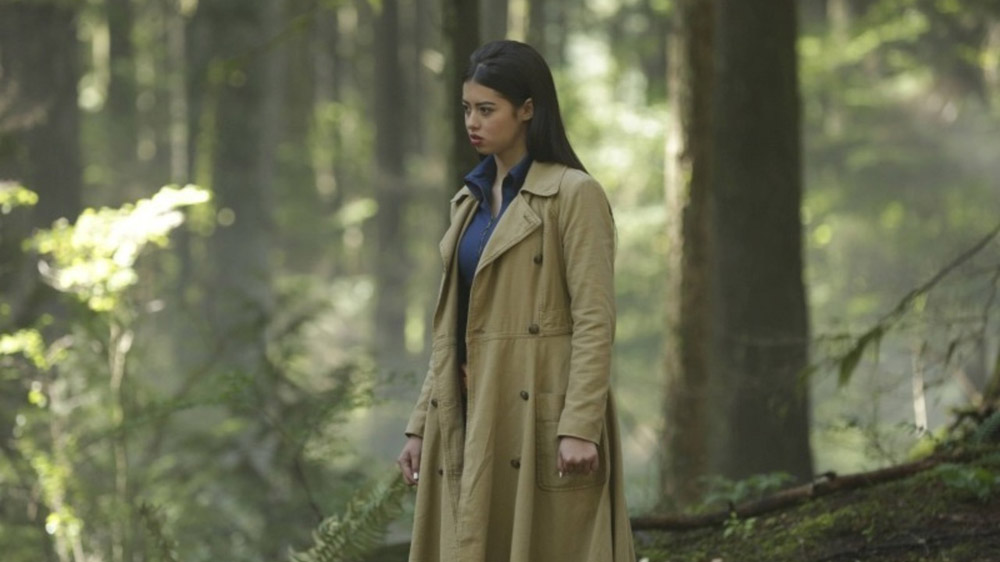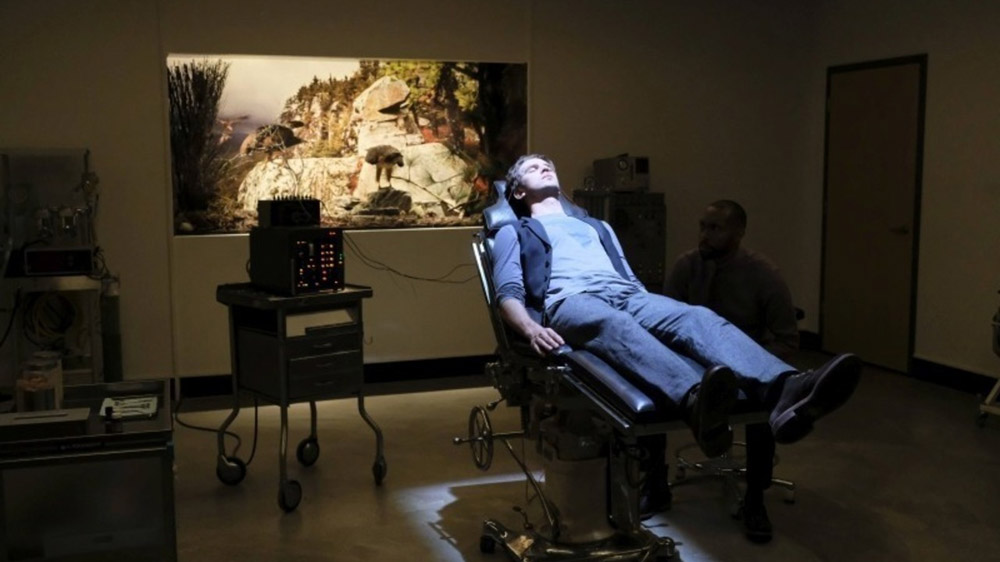In the final scene of Legion’s fourth episode, there’s a sign by the side of the road that reads ‘Slow down: uncertainty ahead’.
No-one ever told Legion that.
‘Chapter 4’ is a rapid step up in every way for Legion, accelerating the pace of the season while throwing in a dizzying amount of baffling stylistic elements to ensure that it’s an episode that matches, if not outstrips, the sheer weirdness of the pilot after a couple of episodes that indicated a desire to become a touch more conventional.
In other words, it’s the kind of episode where a key montage sequence included a man dancing in his floating ice cube home on the astral plane. Something special.
If last episode provided some kind of tether to reality through the frequent exposition scenes that granted David clarity about his condition, then ‘Chapter 4’ cuts that cord entirely.
From the beginning, where Jemaine Clement’s Oliver speaks to the audience directly about the nature of storytelling in provoking both empathy and fear, ‘Chapter 4’ invites you to question everything by first choosing to question itself.
Through a line of throwaway dialogue between Syd and Ptonomy, or the revelation that David invented a pet dog in his memories out of pure fiction, Legion casually undermines our faith in the reality of what we’re seeing at all times.
Director Larysa Kondracki has a keen eye for disconcertingly unreal imagery even in the ‘real’ world, from the bizarre lighthouse home of David’s old therapist to woodland vistas drenched in unnatural light.

Even in an episode that takes place on two defined levels of reality, there’s no clear delineation between what’s real and what’s not. In a show with a lead character with unimaginable psychic powers of projection and delusion, reassuring objective reality isn’t a factor.
Legion’s key themes so far have been identity and memory and the connections that exist between them, and ‘Chapter 4’ develops them by throwing both into complete doubt. A key part of how it accomplishes this profound questioning of the self is through leaning into its genre elements and foregrounding the many mutant powers featured among its cast.
As it turns out, there’s a clear common thread here. It’s a cast filled with duplicates and halves, with mutants who can blur the lines between mind and body and in doing so, they feed into that instability that pervades the entire episode.
Cary and Kerry, the two-in-one scientist/fighter who inhabit the same body, are a great example of this. In many ways, they’re two people with drastically differing personalities, but they can just as easily be described as two halves of the same whole, splitting the functions of one person. It’s notable how the characterisation of both Cary and Kerry is obsessively focused around one skill and one small range of personality tics, making them feel purposely incomplete even as their missions take them in opposing directions.

Or take Syd and the Eye, whose body-swapping and shapeshifting powers create a finale where David, who’s just teleported back into the real world, finds himself a victim of this uncertainty of identity and pursues the wrong person in a way that leads to Kerry getting shot.
Or Ptonomy, whose ability to invade memory allows him to point out the terrifying uncertainties that lie within the past that’s shaped us and call attention to the blurred line between fact and fiction that’s thrown David’s self into complete question.
Legion’s crowning achievement has been to use the basic toolbox of superhero fiction to craft something artistically disorientating where every genre element serves a precise thematic purpose. ‘Chapter 4’ only secures that success by portraying the surreal consequences of these mutants’ abilities and the insecurity of identity that they create.
And then there’s David. His journey on the astral plane is the bizarre apex of ‘Chapter 4’, where all of the uncertainty and duality that pervades the episode find a home in the form of a giant ice cube floating in the void of the astral plane (I can’t believe I’m writing sentences like this!).

It’s primarily a journey of clarity that boils down to some solid answers and eye-opening teases for the mysteries of David’s mind. The yellow-eyed devil is definitely a ‘parasite’, and the references to ‘King’ elsewhere provide a direction for all of those theories for those either immersed in Marvel lore or a frequent user of Wikipedia (sadly, I’m the latter).
David’s friend Lenny, revealed in Syd’s quest to be, in another example of the motif of duplicates and halves, a man named Benny in reality, definitely has nefarious intentions and may even be another form of the yellow-eyed devil if the final shot is any indication. And as the entire sequence shows, David’s powers now include the ability to project an entire, simulated existence in between dreams and reality.
Given how abstract and elliptical ‘Chapter 4’ is for the most part, these irrefutable answers are a relief, and a strong way to balance the scales with a palpable sense that we really have progressed another rung up the ladder in Legion’s narrative.
There’s also a lot of pure fun to be had in ‘Chapter 4’, with the experimentation of the narrative frequently verging on the gleeful.
Jemaine Clement’s guest turn as Oliver, the inhabitant of the aforementioned giant ice cube, is delightfully weird, taking in beat poetry, a three-minute monologue to camera and a nifty dance sequence while Clement imbues this quirkiness with quiet hints of psychological suffering from his long period of solitude.
Kerry’s fight sequence with the Division goons, meanwhile, is a terrifically inventive set-piece that’s part balletic brawl and part swooping dance sequence as the two halves of the same whole fight in tandem, proving that Legion’s just as adept with the blunt force physicality of the genre as the cerebral elements that it’s pushed to the fore.

There’s barely a bad word to say about this episode. It’s the most confident version of Legion yet, secure enough in its themes and character development to step up the thrilling experimentation that seemed to have reached its peak in the statement-making pilot.
Most of all, it’s done this all within the confines of the superhero genre, using many of the ideas and motifs, such as varying mutant powers or an astral plane existing beyond human perception, that can be seen on any blockbuster screen every few months.
Legion has proven itself to be the bizarro world superhero show that the genre always needed, and it seems like there’s still immeasurable room to grow.
Aired at 9pm on Thursday 2 March 2017 on FOX.
Follow Louis Rabinowitz on Twitter here.
What did you think of this week’s episode? Let us know below…

